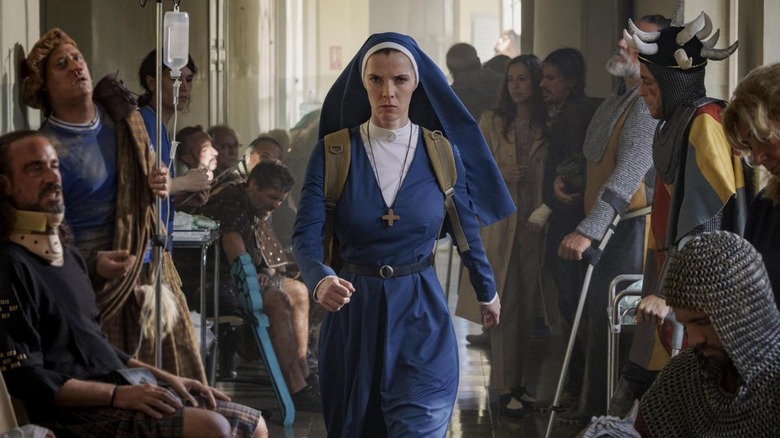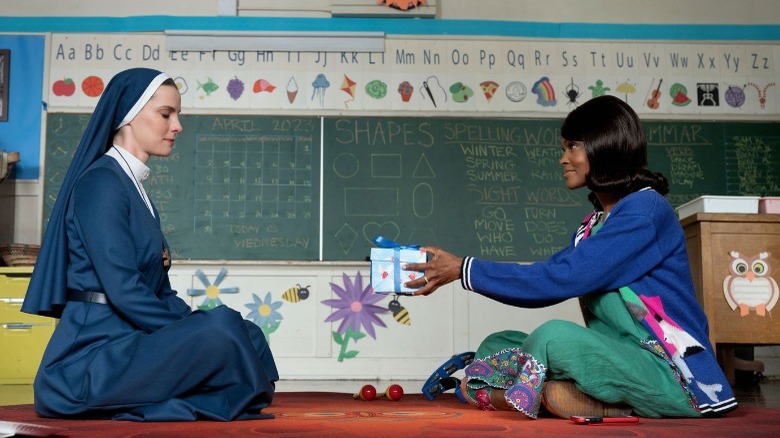How Pokemon Go Inspired The A.I. Villain In Damon Lindelof's Mrs. Davis
"Mrs. Davis," Peacock's upcoming sci-fi comedy drama action genre mashup television series, paints a portrait of artificial intelligence that's arguably more sinister than mere killer robots. /Film's own Jacob Hall called the series "the most audacious new science-fiction series since 'Westworld'" after catching a preview at SXSW. Co-creators Damon Lindelof, who's become a legend in the annals of science fiction television for his work on "Watchmen," "Lost," and "The Leftovers," and Tara Hernandez, who has written for and executive produced "The Big Bang Theory" and "Young Sheldon," have created a way to portray A.I. that fits more in line with the addictive pull of social media apps than it does the typical computer-gone-rogue. Mrs. Davis, the titular name of the A.I. program, bears resemblance to a multitude of modern-day apps, including the wonderfully communal and cute "Pokémon Go."
That's because "Mrs. Davis" proposes the fascinating question of whether it's truly possible to have a benevolent A.I. The series doesn't necessarily portray the Mrs. Davis program as inherently evil or conspiring with ill intent to destroy humanity. Rather, her friendliness is exactly what makes her so dangerous since people are drawn to her personalized interactions. The show reportedly will have a lot going on, but the gist is that the Mrs. Davis A.I. offers her users "angel wing" rewards for completing assigned tasks like they're quests in a real-life video game. The algorithm has good intentions, but like any story about A.I.-gone wrong, Mrs. Davis' idea of a better world may mean something quite ominous for the rest of us.
Pokemon as God
Mrs. Davis' omnipresent voice circulating through her disciples' earbuds and her promises of redemption make her seem like a lot like a more accessible form of God, a central idea that runs throughout the series. In an interview with The Hollywood Reporter, Lindelof explains:
"To us, that felt like the more potentially comedic and interesting way of looking at the God question, which is: 'What do people turn to God for? How does God make people feel?' The thing about A.I. is it takes away the best part of God's branding, which is mystery."
So where does Pokémon Go fit into all of this? Well, as Kathryn VanArendonk of Vulture points out, the idea of an app sending people out into the world to participate in missions to earn points sounds a lot like the augmented reality game that incentivized its players to go "catch Pokémon" outside their homes. For those that were privy to witness and participate in that glorious summer of 2016, "Pokémon Go" felt like it was uniting communities together, giving people an opportunity to meet each other based solely on the same quest to catch a Pokémon. It felt anything but evil, but that's why it's such an effective frame of reference for "Mrs. Davis."
Lindelof stated that the creators "wanted the opposite of exoskeletons crushing human skulls," and Hernandez explained that Mrs. Davis isn't "going to turn everyone into sheep. They're going to willingly surrender themselves to her influence." Pokémon Go didn't feel like a responsibility, it felt like a reason for existing in the digital sphere. If Pokémon can travel that far into the human brain, Mrs. Davis can probably go even further.
"Mrs. Davis" arrives on Peacock on April 20, 2023.

